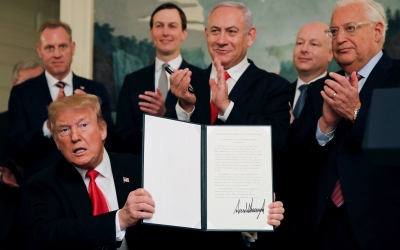Greenblatt's bitter legacy: A huge leap forward for Israeli unilateralism

In September 2017, just months into his newly-minted position as the US special representative for international negotiations, an optimistic Jason Greenblatt outlined what the Trump administration hoped to accomplish towards Israeli-Palestinian peace.
“Instead of working to impose a solution from the outside, we are giving the parties space to make their own decisions about their future,” Greenblatt said. “Instead of laying blame for the conflict at the feet of one party or the other, we are focused on implementing existing agreements and unlocking new areas of cooperation which benefit both Palestinians and Israelis.”
At the same meeting, Greenblatt also took some credit for two “historic” achievements: an Israeli-Palestinian water pricing agreement and the advancement of a power purchasing agreement between the parties. In addition, he presented a list of action items that he intended to pursue to support Palestinian economic development.
Greenblatt’s tenure as Middle East peace envoy stands in complete contradiction to what he said. The US has worked methodically to impose a solution on Palestinians, with the assistance of key regional governments.
When it became clear that no amount of sanctions against Palestinians or their leadership would convince them to accept living indefinitely without political rights or sovereignty, Greenblatt made it part of his job to regularly tweet blame at Palestinians.
New MEE newsletter: Jerusalem Dispatch
Sign up to get the latest insights and analysis on Israel-Palestine, alongside Turkey Unpacked and other MEE newsletters
'Historic' achievements?
Greenblatt's departure from the administration matters little. The destructive course he has set Palestinians and Israelis on will be difficult to reverse
Now, with his departure from government imminent, it is important to assess Greenblatt’s efforts in executing the agenda he set out for himself and the administration.
Greenblatt did not shepherd two groundbreaking agreements between Israelis and Palestinians. According to Palestinian Prime Minister Mohammad Shtayyeh, the power purchasing deal stalled, and despite the headlines about Greenblatt presiding over a deal to rehabilitate the Dead Sea with water from the Red Sea, while also providing much-needed desalinated water to Jordan and the occupied Palestinian territories, what was agreed to was not so fabulous.
Expropriating water
In fact, the water purchase deal had little to do with the regional water conveyance project known as the “Red-Dead.” According to former PA officials, the “historic” agreement was nothing more than an intention by the PA to buy surplus desalinated water that the Israeli government was otherwise obligated to buy at cost from Israeli desalination plants.
Instead of the US using its considerable influence to compel Israel to give Palestinians their equitable share of transboundary water, which Israel has been expropriating for the benefit of Jewish settlers in the occupied West Bank, the PA agreed to purchase water from Israel because of the great need for more water in Gaza and the West Bank.
At that time, relations between the PA and President Trump were good and there was a belief that the new US administration was serious about facilitating a comprehensive agreement between Palestinians and Israelis that would deal with final status issues like the equitable allocation of shared water resources.
Besides his efforts on the water and power agreements, Greenblatt identified a number of other concrete steps that the US would pursue to support Palestinian economic development, such as the easing of restrictions that Israel imposes on the movement of Palestinians and on their economic activity; improving the humanitarian situation in Gaza; fast-tracking Palestinian projects stalled because of Israel’s withholding of building permits to Palestinians; and getting Israel to release the tax revenue it collects on behalf of Palestinians.
Like former secretary of state John Kerry, who also understood that these measures as important prerequisites to developing the Palestinian economy, Greenblatt did not succeed. Unlike Kerry, however, it is unclear whether Greenblatt and the members of the Middle East peace team made a good-faith effort.
Misguided policies
US actions taken against Palestinians by the Trump administration include denying that the West Bank is under Israeli military occupation, moving the US embassy to Jerusalem, closing the Palestine Liberation Organization office in Washington, and cutting all aid to Palestinians and to the UN refugee relief agency serving them.
Now, the State Department website has also removed the occupied Palestinian territories from a list of Middle Eastern countries served by one of its bureaus, with the apparent message being “out of sight, out of mind”.

What Greenblatt does deserve some credit for is the failure of the “Peace to Prosperity” economic workshop held in Bahrain in June, where there were no takers for the $50bn worth of regional projects listed in the glitzy brochures, and for the accelerated economic decline in the occupied territories resulting from US aid cuts.
The administration’s misguided policies are also creating a schism between the progressive base of the US Democratic Party and its leadership, contributing to the further polarisation of the country’s political landscape.
At the end of the day, though, Greenblatt’s departure from the administration matters little. The destructive course he has set Palestinians and Israelis on will be difficult to reverse; it has made the conflict more intractable and more likely to spiral into high-intensity violence.
Any new Israeli coalition government formed after the upcoming election will not only feel emboldened to move ahead with the annexation of illegal Israeli settlements in the West Bank, but it will feel compelled by right-leaning voters who know that the Trump administration will erect no speedbumps to slow down Israeli unilateralism. This will be Greenblatt’s greatest achievement.
The views expressed in this article belong to the author and do not necessarily reflect the editorial policy of Middle East Eye.
Middle East Eye delivers independent and unrivalled coverage and analysis of the Middle East, North Africa and beyond. To learn more about republishing this content and the associated fees, please fill out this form. More about MEE can be found here.






